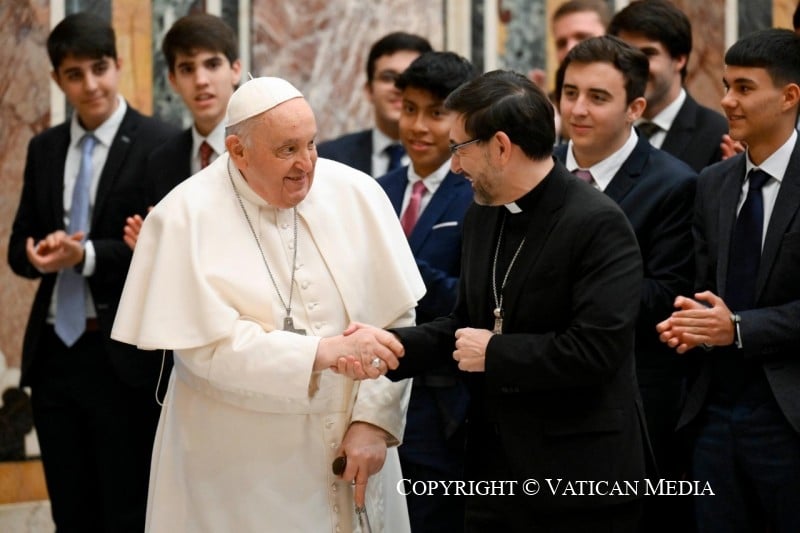This morning the Holy Father Francis received in the audience, in the Clementine Hall of the Vatican Apostolic Palace, the Community of the Seminary of Madrid.
These words of Saint Manuel González perfectly summarize the centrality that the Eucharist must have in the life of the Seminary.
“A seminary in which the Eucharist would be: in the pedagogical order, the most effective stimulus; in the scientific order, the first teacher and the first subject; in the disciplinarian, the most vigilant inspector; in the ascetic, the most vivid model; in the economic the great providence; and in the architectural the cornerstone”.
We publish below the speech that the Pope delivered to those present at the Audience:
Speech by the Holy Father
Address of the Holy Father
Dear brother, dear seminarians,
We find ourselves here thanks to a happy coincidence: His Eminence Don José will take possession of the church of Santiago y Montserrat, which unites in its titular saints the apostolic faith and love for Mary that characterizes all of Spain.
And Don José also comes accompanied by his most valuable treasure, which is you, his seminary. Many holy bishops of Spain have confronted the difficult reality in which their churches found themselves, and have thought of the seminary as the place where their pastoral dream could lay down solid roots and expand. In reality, if we want to make the Church the Body of Christ, it is easy because, as God said to Moses, all we need to do is keep our eyes on the model we have seen on the mount (cf. Ex 26:30), the Transfigured Christ present in the Eucharist.
I am reminded of a saying of one of these holy bishops, whom you probably know; he wanted “a seminary in which the Eucharist would be: in the pedagogical order, the most effective stimulus; in the scientific order, the first teacher and the first subject; in the disciplinary order, the most vigilant inspector; in the ascetical order, the liveliest model; in the economic order, the great providence; and in the architectural order, the cornerstone” (Saint Manuel González, Un sueño pastoral).
Let us review these points so as to place God at the centre, or rather, to allow Him to be the foundation, the plan and the architect, the cornerstone. This is obtained only with adoration. Jesus – our saint tells us – will do so as a pedagogue, patient, severe, gentle and firm according to what we need in our discernment, because He knows us better than we know ourselves, and He waits for us, He encourages us and He sustains us throughout our journey. He is our greatest stimulus, because we have consecrated our lives to follow Him.
It seems fundamental to me that in the scientific field, Saint Manuel unites being the master with being the subject. God wants to give His people pastors according to His heart (cf. Jer 13:15); from Jesus we do not learn things, we welcome Him, we hold on to Him in order to be able to bring Him to others. And the great lesson that the Lord gives us is humanity, He became flesh, earth, man, humus for us, out of love. And in this matter, there is no other example than Himself; of other virtues and circumstances Jesus will present parables, comparisons, figs, seeds and storms, but the great lesson of His life we can only learn from those who are “gentle and lowly in heart” (Mt 11: 29).
For discipline, confronting the Eucharist every morning – the most vigilant inspector – makes us reflect on the futility of our worldly ideas, our desires to ascend, to appear, to stand out. He who is immense makes a total gift of Himself and in my hands, before communion, He asks me: have you reconciled with your brother? Have you dressed yourself in your festive garb? Are you ready to enter my eternal banquet?
So far, we have seen discernment, science and vigilance; they are certainly key aspects in your seminary, but they would serve nothing without ascesis. To emulate a model presupposes effort: making a work of art requires inspiration, but also work. Jesus did not evade all this. It is necessary to enter into the desert, so that He may speak to our heart. If this is filled with worldliness, with things, however “religious” they may be called, God will not find room, nor will we hear Him when He knocks on our door. Therefore, silence, prayer, fasting, penance, and ascesis are necessary to free ourselves from what enslaves us, and to be fully God’s. And this not only inwardly, but also outwardly, in work, in plans, abandoning ourselves to Jesus: the Lord will be the great providence, let us leave it to Him to propose and realize, let us merely put ourselves at His command with docility of spirit.
Dear brothers, trust in He who called you to this beautiful task, and prostrate yourselves in adoration so as to be able to build with docility the temple of God in your people and in your communities. And when you communicate, and one day when you celebrate, do not forget to pray for me. Thank you.
______________________________
Holy See Press Office Bulletin, 3 February 2024










